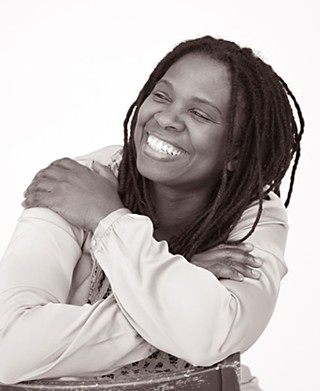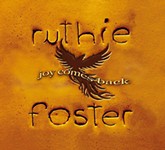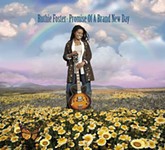Full Circle
The gospel according to Ruthie Foster
By Doug Freeman, Fri., Jan. 27, 2012
"When my mind didn't know how to get there, I trusted my heart, and I swear, my soul came to welcome me home."
The opening lines of Ruthie Foster's new album Let It Burn peel back a prayer in repetition. A statement fraught with the struggle of faith and persistence. Raised up on the gospel harmonies of the Blind Boys of Alabama and the twisting floods of Dave Easley's steel guitar, each utterance becomes a cry of braced determination and belief.
Foster's low moans wind themselves between the guiding grooves of a New Orleans studio band assembled from legends: Ike Stubblefield's ascending B-3 organ, George Porter's intuitive bass, and Russell Batiste's guiding percussion. It's a team gathered by producer John Chelew to push Foster's powerful blend of rootsy soul forward with a brazen and unexpected selection of songs ranging from Adele's "Set Fire to the Rain" and the Black Keys' "Everlasting Light" to June Carter's "Ring of Fire" and David Crosby's "Long Time Gone."
"Keep trying to get there, been trying to get there, keep trying to find my way home."
One of only two Foster originals on the LP, "Welcome Home" commences something greater than just the album. It's the underlying principle of purpose that allows for the variables that follow; the tension from which evolution unfolds; the strength and surety of foundation amid the uneven footing of independence and the unknown.
As Foster rolls the song into the final hymnlike hums proclaiming "Welcome," a spiritual embrace opens: the confluence of yearning and strength, ambition and support. It's home.
The Truth According To
Home for Foster is a modest house tucked inconspicuously into a South Austin neighborhood, shared with Katie, her partner of five years, and their 8-month-old daughter, Maya. The child tumbles around the family room with the elastic sprawl of a nascent toddler. Though Katie carried and gave birth to the couple's daughter, there's an uncanny resemblance to her adopted mother as well. Maya's eyes dart in equal parts wonder and slight mischievousness like Foster's.
"Having a kid, creatively, changes everything about having time: I don't have any!" laughs Fosters later on her back porch. "People ask me when the kids' CD is coming out, but I don't have time for that!"
On this early January morning, fallen leaves sweeping across the backyard with each gust of arrested autumn, Foster exudes that gratified sense of domesticity. In a comfortable gray sweatshirt, a mug of tea clasped between her hands and her cornrowed hair pulled casually back into an exploding bouquet, the 47-year-old songwriter laughs and sighs in the same breath.
Her wry and wistful grin matches the flicker of excitement in her eyes as she discusses the upcoming tour; longtime live collaborators Samantha Banks and Tanya Richardson are due at any moment for the first rehearsals of the new material. Songs remain raw, unworked, and unarranged for how Foster will transform them live.
"It's been really different for me," admits Foster. "We've been playing the same songs for a long time, the same kind of set. I'm playing more guitar, actually playing some electric now. I have to focus quite a bit more. It's teaching me to be really present in every note, every song, all of it.
"I'm not necessarily reinventing myself, but I'm definitely open to what this has incorporated as far as my growth musically and in every way. It's fun. Challenging, but fun."
Crossover
Foster's live show revels in storytelling, in the narratives and personal histories that inhabit her songs. As much as her voice is a distinctively powerful and affective unburdening of soulful blues, those stories define Foster's music and relationship to her fans.
Recalling her childhood, they're tales of growing up on her grandfather's property along the Brazos River on the edge of Milam and Burleson counties. Outside the tiny speck of a town called Gause, there's a stretch of road colloquially called Six Mile.
"It was a long bus ride from Six Mile, and my cousins would sing," recalls Foster. "They would do four-part harmony, and I'm just a little bitty thing sitting back there grinning. They were beautiful. I didn't want to sing at all because it was so intimidating."
There are stories of the tiny New Hope Missionary Baptist Church, where Foster's uncle was superintendent and most of the choir consisted of her family; where her grandmother, Big Mama, presided among the patriarchs in the amen corner with her fan and pink hat. It was Big Mama who nodded approvingly when Ruthie stepped forward hesitantly to take her first solo before a few dozen members of the congregation.
There are other stories that don't make the stage. At 12, Foster's stepfather died and her mother fell ill, leaving her to care for her younger brother and sister.
"I grew up quick," acknowledges the singer. "I had to get us all up every morning, make sure we had breakfast, make sure everybody got to school, hair combed, teeth brushed. And mom was sick, so I had to make sure she had her medication. So I just went into my shell, and in junior high, I was put into special ed classes because back then they didn't know what to do with you in a regular classroom if you weren't keeping up.
"I was tired!" she exclaims with a light laugh. "I was a tired little kid and resentful for having had that responsibility put on me. But I had music and I had art. That was my outlet and that's what pulled me out of all that."
By high school, she'd found her identity, if not quite her place, carrying her guitar to school and writing songs. Supportive teachers began to recognize her talents, so much so that her music teacher helped Foster sneak away to Waco to take the SAT, unbeknownst to her mother. "I desperately wanted to get out of town," remembers Fosters. "I loved the town and my family and friends, but I knew there was just something else. I was one of those kids that my Big Mama always said, 'You're just different, baby. You're just gonna be different, and that is OK. But you gonna have a few hard times because you're so different, so you just gotta prepare yourself for that.'"
Runaway Soul
In 1982, Ruthie Foster began a three-year music program at McLennan Community College in Waco. It was only some 80 miles northwest of her hometown but far enough away to strike out on her own. There she formalized her musical upbringing in the church and her self-taught guitar technique while incorporating more diverse styles like jazz into her repertoire. Even so, after graduation Foster enlisted in the Navy.
"I knew I'd figure out the music thing later," she says. "I was inundated with music at that point, and really just wanted to do something different, to be able to talk to somebody and not have to talk about music. And I loved it. I loved being in the Navy."

Even in the military, Foster couldn't escape the pull of her talent. After an impromptu performance at a holiday party, her commanding officer recommended her for a position in the Navy band, which she accepted, opening up an entirely new musical experience and education.
Foster's reputation spread so quickly within the band's ranks that she was asked to audition for the President's exclusive Navy jazz ensemble, the Commodores. She was offered the prestigious position, which would have put her in line to be the first black officer in the Navy bands, but true to her restlessness, she declined. Instead, she left the Navy at the end of her term and settled with her new husband James Lamb in Charleston, S.C., taking a job booking a new folk venue converted from a former strip club.
"You know, I think I just love challenges," she laughs. "We still had the stripper curtains and the catwalk stage, and I was the only performer there for a while. We had some folks come in and they were a little confused."
The job introduced Foster to a new world of folk music, including Woody Guthrie and the Grateful Dead, both of which complimented her own soul and gospel roots. She eventually landed with Big Beat Records, an independent label run by a young executive named Craig Kallman, now chairman and CEO of Atlantic Records. When Atlantic acquired Kallman's label in 1991, Foster suddenly found herself working as a songwriter for a major label in New York.
"Atlantic Recording Artist" opened doors, and co-writing sessions with hit songwriters taught her an arduous craft, but by 1994, over a decade since she first lit out from Six Mile, Foster knew it was time to return home to Texas. Her mother, stricken with Lupus, had entered a nursing home, and her marriage was dissolving irrevocably, if amicably.
"It was time to just come back to base," Foster sighs. "But I knew I wasn't going back when I piled my guitars and amp and Navy seabag into my Nissan king cab. I remember seeing Jersey in my rear-view mirror, seeing that sign disappear, and I knew, as I headed down I-95, 'I'm not coming back.'"
The Phenomenal
"I came home to be my mother's daughter," Foster declares with an odd mix of pride and humility. "I came home to be that daughter that she wanted me to be."
At 30, Foster found herself back in Texas, working at a television station in College Station, playing piano in church on Sunday, and spending days with her mother at the nursing home. It seemed a sabbatical from the prodigal daughter's wandering music career, yet the two years spent with her mother before she passed away was a regrounding, a reaffirmation of faith in family, and a time of dedication to songwriting on her own terms, her own roots.
Foster's move to Austin seemed inevitable, and when she arrived in 1997, she had already insinuated herself into the music scene through open mics, gospel brunches, and a tight network of collaborators and fans. Free of major label obligations and expectations, she had finally self-recorded a debut album, Full Circle, which showcased her songwriting and earned her a deal with Blue Corn Music for her 1999 sophomore effort, Crossover.
Both albums established Foster as a new voice in Austin alongside her partner and collaborator, Cyd Cassone, but 2002's Runaway Soul managed to polish the full range of her musical influences with production from Lloyd Maines. Boldly titled LPs, The Phenomenal Ruthie Foster in 2007 and The Truth According to Ruthie Foster in 2009, propelled her into ever more vibrant and soulful territories, the former exploding with a funk urgency under the care of Papa Mali, and Truth unleashing an incomparable Memphis, Tenn., backing at Ardent Studios that included Jim Dickenson and Robben Ford. A 2010 Grammy nomination for Best Contemporary Blues Album followed.
"Papa Mali really brought out so much that was going on," Foster reflects. "I was in the middle of a huge breakup with Cyd; as partners we were separating and musically, too, so I used a lot of that in the studio, as therapy I guess. Papa Mali was very sensitive to what was going on but still able to guide me musically and push me.
"And with Truth we just wanted to do a true soul album. That's why we went to Memphis, because you gotta just go there to get it right."
Welcome Home
Samantha Banks and Tanya Richardson arrive at Foster's house for practice as Katie returns with Maya in her arms. Everything is suddenly a whip of movement and sound inside, the morning back-porch reverie broken.
"I plan on bringing everyone out with me when I can," says Foster about the upcoming tour for Let It Burn. "I want to expose Maya to as much music as possible, get her integrated into what this mommy does."
Foster lets loose a light chuckle that can't hide a hint of joyful trouble, that slight glint of rebellion she confesses used to knowingly frustrate her mother. There's also a sense of completeness, of having come full circle as Katie and Maya come to the back door.
"My mother would always tell me and the people that would come into our lives, 'Now, I know you love my baby, but if it ever gets to a point where it ain't that anymore, you send her home, because she always has a home.'
"That's what I want to pass on to Maya, that she will always have a home. Even if it's just my little property down on the Brazos, you will always have a home. And that's important. Home and family. That's what I write about. All the music stemmed from that and even all the desire to go and be somewhere else all the time. It always comes back to that core.
"Home."
Set Fire to the Rain
"Ray Benson told me a few years ago, 'You're a great songwriter and a singer, and everyone in town knows that, but being a great song interpreter, too – that's something that people need to discover about you,'" offers Ruthie Foster by way of explanation for Let It Burn's somewhat unexpected tracklist.
Foster turned to producer John Chelew (Blind Boys of Alabama, John Hiatt), and although they had never met, his song suggestions intrigued her enough to recognize the possibilities.
"It was one of the most thrilling projects I've worked on," reckons Chelew. "Ruthie just covers so much as far as her influences and tastes go."
Chelew wanted to press further and began listening to the radio with Foster's voice in mind. The variations on "Long Time Gone," "If I Had a Hammer," and "You Don't Miss Your Water" were inspired, but Chelew's contemporary selections of the Black Keys' "Everlasting Light" and Adele's "Set Fire to the Rain" make the boldest challenges.
"Because it was Adele, I thought it might be too popular," says Chelew, "but we really wanted to say that we're starting from this moment. We wanted to start from now, with a song that's being played on the radio. It's a beautiful song, but to hear it played by New Orleans players and stripping it back, we kind of reorganicized it, I guess, the way it would have been if it had been written in New Orleans by New Orleans musicians.
"The idea was capture the listener right away but to cover the waterfront with old songs and new songs. The common link is this unbelievable singer."
Ruthie Foster celebrates the release of Let It Burn with opener Hadden Sayers at Antone's Friday, Feb. 24.











